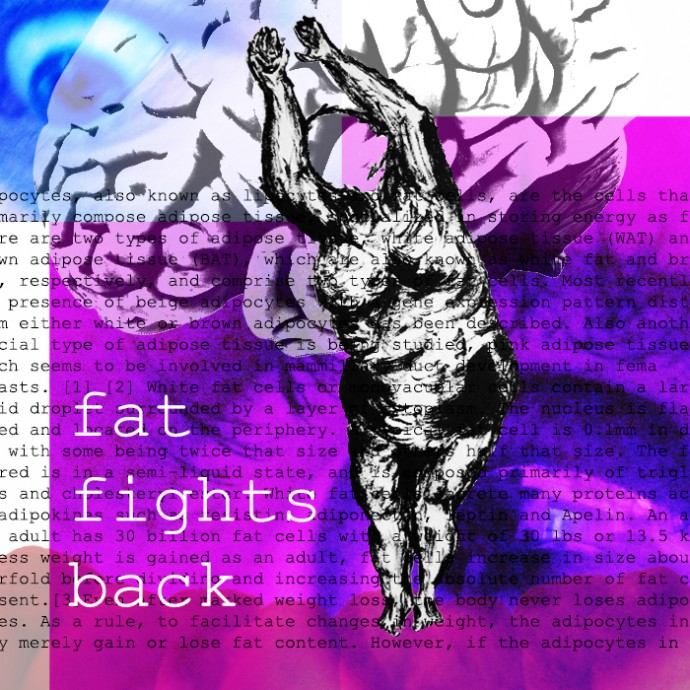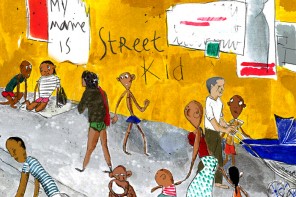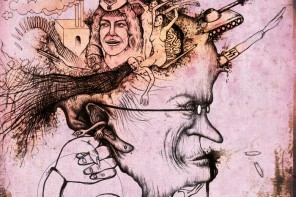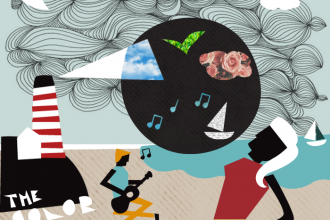Fat people: eating away at our world resources, our healthcare systems, even our very faith in humanity… at least, this is the idea that we are fed by the media. It’s likely you’ll laugh at the very idea of fat studies, or its more politically directed relative, fat activism. But before you jump on the bandwagon declaring fat as the world’s primary evil, you might want to hear about how fat studies can benefit YOU.
Dr. Cat Pausé of Massey University, New Zealand, is a fat studies academic, activist, and the author of Queering Fat Embodiment. With three degrees racked up from her native Texas in the fields of sociology and human development, she knows a thing or two about what we think we know, and why we think we know it. Cat spoke to Sensa Nostra about the power of consensus in establishing scientific truth and the importance of fat studies for people of all sizes.
There’s a joke that all scholarship is thinly veiled self-interest. A lot of people tend to study things that are quite close to them or part of their own lives. I was always interested in the social construction of health, so it was through my work around stigmatized identities that I became more drawn to looking at the aspect of size and how that impacts people’s understandings of themselves.
I use the word ‘fat’. It’s truly an ‘F’ word, like ‘feminism’; you say it in a room and people get really uptight. That’s always a fun game to play. It’s the word I prefer because the ‘O’ words are just useless: ‘overweight’ implies that there’s a weight to be, and ‘obesity’ is the pathologisation of a body size. Why would I want to do that? I think it’s powerful to take back the word ‘fat’ and to use it to describe myself. It’s always interesting to see people’s reactions because the people I surround myself with have become used to me using it, but when I’m in mixed company it often makes people uncomfortable. I’ve gone my entire life with people rushing to say I’m not fat, which is silly because there’s no doubt in the world that I’m fat. I think what people mean is that they don’t associate me with the negative stereotypes with which the word tends to be associated. They don’t think I’m lazy, stupid, worthless, or smelly. Well, I am fat, but that doesn’t then mean that I’m all those other things too.
It wasn’t until I was finishing my PhD that I came across two books, Paul Campos’ The Obesity Myth and Marilyn Wann’s FAT! SO?, which looked at how this ‘obesity epidemic’ in which we’re living has largely been blown out of proportion. The relationship between body size and health is much more tenuous than people think, in terms of what the science actually tells us when we start picking it apart. Is it the size that actually matters, or the lifestyle habits—or maybe it’s the stress that comes from living in a society that openly hates you? From the activist perspective, the argument is that even if fat people are the worst thing ever, does that then mean that they’re not worthy of basic human rights?
As a fat woman, I’ve always had this feeling that there’s nothing wrong with me, but I was never willing to admit it—because according to the rest of the world, of course there was something wrong with me. Reading FAT! SO? was the first time I thought that sneaking suspicion of mine might be something to hold on to. Then, looking into the literature Campos was referencing, I realized that there’s a huge amount of obesity literature that challenges the commonly held beliefs that we have around weight and health and size.
Fat studies arose partly in response to this normative discourse around the issue, just like women’s studies arose in response to the discourse around women producing a really specific idea: ‘mansplaining’. When trying to grasp the social construction of health, I think it’s useful to remind people that it used to be empirically supported that women were naturally inferior to men, and also that homosexuality was a mental illness.
Any class in fat studies is going to have at its core important aspects of social justice, exploring kinds of privilege and appreciating the social construction of most of the things that we tend to take for granted as truths.
You should look up ‘obesity paradox’. It’s this really great term that researchers have started using in order to publish work that finds that obese people are in just as good or even better health than non-obese people. In the last four years especially there’s been a flood of these kinds of articles, and I’m working on my own: a Thomas Kuhn kind of thing that suggests that the obesity paradox only exists if you first assume that obesity is unhealthy.
If you take that assumption away, you simply find that some people are healthy and some people are not, and some of those healthy people are fat and some are not. But I think we’re quite a long way from that kind of recognition. It wasn’t until about the late 2000s there was even such a thing as fat studies. By and large, it’s white Western cis women that are most active in the discipline. I think that’s fairly representative: women bear the burden of fatness in a much different and often much more costly way than men. They say that the best predictor of young girl’s attitudes towards bodies and food is their mother’s attitudes, and I think a lot of us grew up with moms who hated their bodies and had really unhealthy relationships with food that could be identified as disordered eating. We grow up around it and then transmit it to our own daughters. It’s a bad cycle.
I’m producing a paper right now on how you don’t have to be teaching fat studies to introduce fat pedagogy into your classroom. I remember looking at a colleague’s assignment: students were to look at two men and two women, and discuss the impact of their socioeconomic status on the achievement of their goals. It was interesting because the women’s goal was that they’d decided to lose weight. I remember saying, “You realize that by doing this you’re reinforcing fat stigma?” and my colleague was really taken aback because he considers himself a progressive guy. He wanted them to think about access to things like exercise and healthy diet, so I said, “Why’s it got to be couched in this idea that they’ve decided to improve their health by losing weight?” He thought about it, and changed the assignment from losing weight to getting healthy by eating better and exercising regularly. You still get the same result, but you don’t then reinforce the fat-shaming culture to your students.
I think the discipline’s getting more mainstream attention because it sells. The idea of ‘queering fat embodiment’ with things like fat burlesque troupes and fat synchronized swimming groups is so different from the headless fatties that make up the normative discourse. I hosted a fat studies conference in 2012 here in New Zealand that got a lot of media coverage. It was an academic event, but the press just didn’t seem to get that, so I felt a bit bad for the journalists who attended because I think they were disappointed not to find any fat people sitting in circles, eating doughnuts and chanting. As I’m sure you can guess with that in mind, most media attention doesn’t present fat studies in the best light.
Academia aside, my fat activism is mostly through social media. Last year there was a visiting professor at NYU who tweeted, “Dear obese PhD applicants, don’t even bother applying because getting a PhD takes willpower.” Of course we all know that fat people have no willpower…naturally there was a huge uproar online. But then again, most people do think this. That’s what makes fatness a morality issue: fat people are bad people because they’re lazy and lacking discipline, lacking good qualities in a Judeo-Christian sense. I’m not interested in trying to alter one specific individual, I’d much rather change the larger social narrative. So in response I created a Tumblr called Fuck Yeah! Fat PhDs, and I encouraged people who were fat with a PhD or working on one to send me a picture with some information. I was flooded, I had over 300 people sending in their stuff. I love it because it’s this great repository of, “People think one thing, let’s show them that this isn’t accurate, that their common sense is off.
Within the last few years, I’ve noticed some mainstream media outlets trying to engage with both sides. When the New Zealand Medical Association put out a report called Tackling Obesity, my local paper had, on Monday’s front page, the typical ‘fatpocalypse’ chat. And then Tuesday was my argument, which was that any time you couch public health messages in anti-fat rhetoric, it’s damaging to people of all sizes. They wouldn’t have done that eight years back when I first came here.
The fat activist movement would reject the idea that we’re in some kind of obesity crisis. They would probably argue that fat activism is actually much more committed to improving people’s health because they’re interested in improving the mental and physical health of people of all shapes and sizes, who are all quite damaged by the fat-shaming and fat-hating world that we live in. Whether it’s eight year-olds who are already going on diets, teenagers with eating disorders, or women in their forties who’d rather lose ten years off their lives than gain five kilos… all of this stands directly from the fact that we live in a culture that hates fatness.







